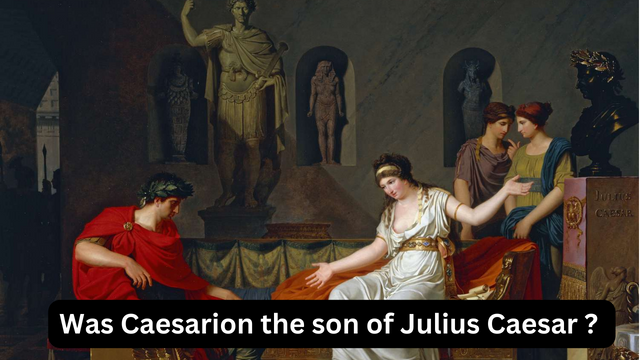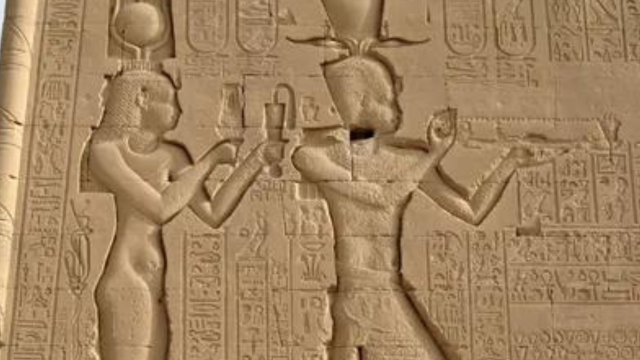Was Caesarion the son of Julius Caesar ?

Ptolemy XV Philopator Philometor Caesar, known as Caesarion, the last pharaoh of Egypt, was probably the only biological son of Julius Caesar, after whom he was named. Caesar fathered him by Cleopatra VII. However, it appeared that Caesar did not officially acknowledge Caesarion, despite Cleopatra’s claim that her son had inherited Caesar’s looks and mannerisms one of Caesar’s supporters.
Julius Caesar didn’t accept him as his biological son
Also written a booklet in which an attempt was made to prove that the Roman general could not have been the father of Caesarion! Every effort was made to avoid a conflict over power with Caesar’s adopted son Octavian, who would become the future Roman Emperor Augustus. Nevertheless, Octavian ultimately ordered Caesar’s assassination in 30 BC.
Cleopatra adamantly maintained that the father of her son was Julius Caesar. On the other hand, Caesar publicly denied or attempted to circumvent the scandalous issue of Caesarion’s paternity. According to the Roman author Suetonius (circa 69 – circa 130–140 CE), Caesar allowed Cleopatra to give her name to Ptolemy XV, although he was unable to legally acknowledge the boy as his son.
Caesar went to the extent of disclaiming Caesarion in his will.
The historian Nicolaus of Damascene (circa 64 BC – circa early 1st century AD) stated that Julius Caesar went to the extent of disclaiming Caesarion in his will. However, this detail is not repeated in any other surviving accounts and is only mentioned to refute rumors that Julius Caesar aspired to become king. Additionally, given the illegality of caesareans, there would have been no legal requirement for Julius Caesar to abstain from performing caesareans.
Caesarion’s paternity
After the Ides of March (the assassination of Julius Caesar on March 15, 44 BC), the issue of Caesarion’s paternity was raised by Caesar’s friends and associates, even though Octavian’s position as Caesar’s heir was clear. The politically charged question remained open as Octavian’s supporters actively denied that Caesar had fathered Caesarion, and Octavian’s opponents actively promoted Caesarion as Caesar’s son.

Lack of evidence
Given the lack of evidence to the contrary, it is generally believed that Caesarion was the biological child of Julius Caesar. However, alternative theories regarding the parentage of cesarean have been put forward and the issue remains somewhat controversial. It has been suggested that Caesar was infertile because, despite three marriages and several extramarital affairs, he acknowledged only one biological child in his entire life. In contrast, low birth rates were characteristic of the Roman aristocracy at this time and it is plausible that Caesar may have had illegitimate children who remained unknown such as Junia Tertia.
Furthermore, it is believed that Cleopatra did not have a lover before meeting Caesar, which precludes any alternative candidates for Caesarion’s paternity. In 6 BC, Caesar dedicated a temple to Venus Genetrix, the patroness of motherhood and marriage, in the Forum Julioum.
Cleopatra and Caesarion as the mother-son duo of Venus and Cupid
Caesar was believed to be a descendant of Venus Genetis through his mythological ancestor Aeneas, a deity associated with the founding of Rome. Caesar made the controversial decision to unveil a gilded statue of Cleopatra as Isis-Venus within the temple during its dedication. A cesarean birth has been cited as a possible occasion to inspire the dedication of this politically charged artwork.
The statue is believed to be depicted in a mosaic excavated from the house of Marcus Fabius Rufus in Pompeii, depicting Cleopatra and Caesarion as the mother-son duo of Venus and Cupid. The installation of this statue in the Temple of Venus Genetics established a connection between Caesar’s perceived heritage as a descendant of Venus and Cleopatra’s perceived status as the reincarnation of Isis-Venus.
Caesarion as the Last Pharaoh
Ptolemy XIV died suddenly in 44 BC, and it was rumored that Cleopatra poisoned her teenage brother to remove any threat to her rule. Shortly after the death of Ptolemy XIV, Caesarion was proclaimed king and became Cleopatra’s new co-ruler. This succession was officially recognized by the Roman Senate as early as 43 BC, thereby ensuring the legitimacy of Caesarion’s official rule.
Artistic representations of Cleopatra and Caesarion intentionally resemble the relationship between the Egyptian goddess Isis and her son Horus. In Egyptian mythology, Isis was the maternal protector of her son Horus, who became the rightful king of Egypt after the violent murder of Horus’s father Osiris.
Therefore, to say that Caesarion was merely a political slander is a bit false, as it is fully accepted that he was born out of Caesar’s affair with Cleopatra, and the famous Roman general fully accepted his son. She did not deny the relationship, which was contrary to Cleopatra’s goal of making Caesar the head of the Roman Republic as her father’s successor.